 Leading Blog | Posts by Month |
 Leading Blog | Posts by Month |
09.30.23

LeadershipNow 140: September 2023 Compilation
See more on
Posted by Michael McKinney at 07:27 PM
09.28.23

Leading Thoughts for September 28, 2023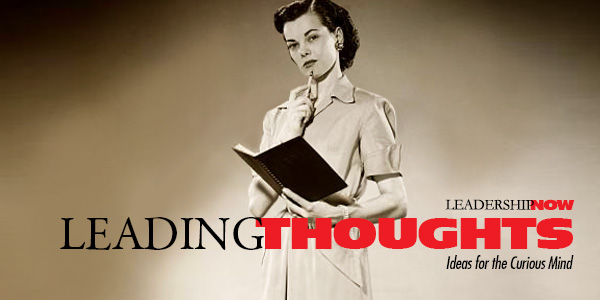
IDEAS shared have the power to expand perspectives, change thinking, and move lives. Here are two ideas for the curious mind to engage with: Bill Taylor on humility and ambition: “Exceptional performance begins with extraordinary insights. But that doesn’t mean it’s your job to come up with those insights. In businesses built on new ideas, generating and evaluating ideas is everybody’s business. That’s why humility and ambition need not be at odds. Indeed, humility in the service of ambition is the most effective mind-set for leaders who aspire to do nig things in a world with huge unknowns.” Source: Simply Brilliant: How Great Organizations Do Ordinary Things in Extraordinary Ways Andy Cohen on assuming people think just like you do: “It’s quite common to get frustrated with another person in your group for not thinking the same way as you do or to become angry when the person acts differently than you would have under the same conditions. There is no right or wrong in these types of situations because each party assumes he or she understands what to do. Yet when things don’t turn out as expected, each party is convinced that the other ‘didn’t listen’ or ‘should have known.’ The ability to create division between people so quickly is what makes [assuming people think like you do] so dangerous.” Source: Challenge Your Assumptions, Change Your World Look for these ideas every Thursday on the Leading Blog. Find more ideas on the LeadingThoughts index.
Posted by Michael McKinney at 06:44 AM
09.22.23

10 Books to Get You Back to Work – Fall 2023
THE FALL EQUINOX arrives on September 23. Time to turn the page. Temperatures begin to drop. The days get shorter. And as plant life slows down and the leaves change color, we should make the time to reflect and take stock of where we are and where we need to go. A good book helps us to do just that. Here are ten books to help you get back into the world of work and make plans for an improved future:
When our trust is broken, and when our own trustworthiness is called into question, many of us are left wondering what to do. We barely know how trust works. How could we possibly repair it? In How Trust Works, Dr. Kim draws on this research and the work of other social scientists to reveal the surprising truths about how relationships are built, how they are broken, and how they are repaired. Dr. Kim’s work shows how we are often more trusting than we think and how easily our trust in others can be distorted.
How do we decide how we decide? We make such decisions all the time. If you trust your doctor, you might decide to follow a simple rule for medical decisions: Do whatever your doctor suggests. If you like someone a lot, and maybe love them, but are not sure whether you want to marry them, you might do this: Live with them first. Some of these strategies are wise. They prevent error. They improve your emotional well-being. Some of these strategies are foolish. They lead you in the direction of terrible mistakes. They prevent you from learning. They might make you miserable. Decisions about Decisions explores how people do, and should, make decisions about decisions.
We used to think of failure as the opposite of success. Now, we’re often torn between two “failure cultures”: one that says to avoid failure at all costs, the other that says fail fast, fail often. The trouble is that both approaches lack the crucial distinctions to help us separate good failure from bad. As a result, we miss the opportunity to fail well. With vivid, real-life stories from business, pop culture, history, and more, Edmondson gives us specifically tailored practices, skills, and mindsets to help us replace shame and blame with curiosity, vulnerability, and personal growth. You’ll never look at failure the same way again.
From the author of Steve Jobs and other bestselling biographies, this is the astonishingly intimate story of the most fascinating and controversial innovator of our era—a rule-breaking visionary who helped to lead the world into the era of electric vehicles, private space exploration, and artificial intelligence. For two years, Isaacson shadowed Musk, attended his meetings, walked his factories with him, and spent hours interviewing him, his family, friends, coworkers, and adversaries. The result is the revealing inside story, filled with amazing tales of triumphs and turmoil, that addresses the question: are the demons that drive Musk also what it takes to drive innovation and progress?
The most effective leaders are “human leaders:” leading with empathy, vulnerability, and authenticity. But many still adhere to the outdated myth that leaders must be “superhero leaders: infallible, unflappable, and fearless." Tragically, their innate ability to inspire remains locked within, blunting their impact. In The Unlocked Leader veteran executive leadership coach Hortense le Gentil explains how superhero leaders can become effective human leaders.
We live in a world that’s obsessed with talent. We celebrate gifted students in school, natural athletes in sports, and child prodigies in music. But admiring people who start out with innate advantages leads us to overlook the distance we ourselves can travel. We underestimate the range of skills that we can learn and how good we can become. We can all improve at improving. And when opportunity doesn’t knock, there are ways to build a door. Hidden Potential offers a new framework for raising aspirations and exceeding expectations.
Speed has gotten a bad name in business, much of it deserved. When Facebook made "Move fast and break things" an informal company motto, it fueled a widely held belief that we can either make progress or take care of people, one or the other. That a certain amount of wreckage is the price we have to pay for inventing the future. Leadership experts Frances Frei and Anne Morriss argue that this belief is deeply flawed—and that it keeps you from building a great company. Helping executives and entrepreneurs solve their toughest problems over the past decade, Frei and Morriss learned that the trade-off between speed and excellence is false. The best leaders solve hard problems with fierce urgency while making their organizations—employees, customers, and shareholders—even stronger. They move fast and fix things.
Throughout his thirty years of work as a mindset expert and leadership coach, Erwin Raphael McManus has been obsessed with these questions: Why do some people succeed despite having all the odds stacked against them? How do others achieve the unthinkable, only to watch their lives slip away? Are there mental structures for failure and success? McManus has come to realize that too many of us have “near-life” experiences. We almost pursue our dreams. We almost make the decision that changes everything. We are always one choice away. In Mind Shift, McManus brings together twelve mental frameworks that have helped some of the most accomplished people on earth create internal structures of success.
Every investment plan under the sun is, at best, an informed speculation of what may happen in the future, based on a systematic extrapolation from the known past. Same as Ever reverses the process, inviting us to identify the many things that never, ever change. With his usual elan, Morgan Housel shows how we can use our newfound grasp of the unchanging to see around corners, not by squinting harder through the uncertain landscape of the future, but by looking backwards, being more broad-sighted, and focusing instead on what is permanently true. By doing so, we may better anticipate the big stuff, and achieve the greatest success, not merely financial comforts, but most importantly, a life well lived.
The logical, inspirational, and simplified approach you need to lead through unprecedented chaos―and help your teams and organizations thrive. Lead Through Anything provides simple, tested and actionable strategies to help you continually level-up your impact as an individual, manager, and leader. It walks you through the process of developing a leadership mentality that balances three key elements to achieve sustainable success. And be sure to include some fiction in your reading. Neurologist Richard Restak suggests for memory’s sake, we should be reading more fiction. He has observed over decades of treating patients for memory loss, that fiction requires active engagement with the text, starting at the beginning and working through to the end unlike non-fiction which you can read in chunks. Fiction requires extended attention and the ability to remember what happened at every stage of the story.
Posted by Michael McKinney at 06:55 AM
09.21.23

Leading Thoughts for September 21, 2023
IDEAS shared have the power to expand perspectives, change thinking, and move lives. Here are two ideas for the curious mind to engage with: John Tierney and Roy Baumeister on it’s what you don’t do: “Being able to hold your tongue rather than say something nasty or spiteful will do much more for your relationship than a good word or deed. Source: The Power of Bad: How the Negativity Effect Rules Us and How We Can Rule It Sean Glaze on complacency: “Being uncoachable is really about being stuck in a comfort zone that a person refuses to acknowledge or leave. Source: Staying Coachable Look for these ideas every Thursday on the Leading Blog. Find more ideas on the LeadingThoughts index.
Posted by Michael McKinney at 06:53 AM
09.18.23

Approaching Leadership Excellence Through New Angles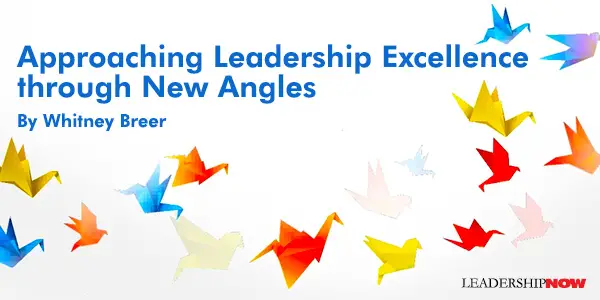
ABOUT 400 years ago, Isaac Newton probably experienced an epiphany when he figured out how prisms work. His experiments showed that when light hits glass at an angle, it not only slows down but also bends as it enters the glass and bends again when it exits, thus leaving the glass at a new angle. The physics of a prism can also be applied to leadership: In an agile work environment, it is valuable to slow down and reconsider which leadership angle to take in particular situations. The PRISM Model offers five angles to leading people and forms the bedrock of leadership excellence. P = Purpose People have an intrinsic need to know that what they do day in and day out has personal meaning for themselves and is meaningful to others; that what they do, in essence, has a positive impact on others and purpose. Most average leaders I have met can recite their company's mission statement but aren't necessarily in tune with their values – solid and unwavering values that drive them toward something bigger and serve as a lighthouse when faced with tough decisions. Excellent leaders live their personal and professional lives in alignment with their core values, which provide their employees with stability, transparency, and consistency. Their employees don't have to waste time and energy playing guessing games about their supervisor because they know from the outset what is important to them, and just as important, they know what contribution they make as the team or company strives toward this purpose. What is your purpose in life? Does it align with your core values? Have you shared it with your employees? R = Relationships Leadership excellence means building and fostering healthy relationships with employees and coworkers. This means taking responsibility for creating a climate where people enjoy coming to work, whether in a virtual setting or on-site. They feel safe not only in expressing their opinions but also know that their opinions are appreciated and valued by you and their coworkers. There is a climate where no negative gossiping or online chats about another person takes place. It's a climate where issues are not swept under the carpet but addressed openly, respectfully, and timely. Teams spend more time together from Monday to Friday than with their families. The workplace can be seen as an extended family. If people work day in and day out in a toxic environment – gossiping, lack of trust, hurting each other – they will not perform at their best. In fact, toxic work environments lead to quiet quitting, burnout, and increased resignations. When leaders have meaningful conversations with their employees, ask open questions, truly listen to them, and nip any toxicity (such as gossiping) in the bud, they are well on their way to fostering trust and building relationships. I = Instilling Energy Emotional contagion is a fact of life. We "infect "people with our energy – be it toxic or positive – within a matter of minutes. Research indicates that the person in the room with the highest power is the one who spreads the energy. Ideally, this is the leader. In some situations where a toxic team member has hijacked the team or derailed a meeting, this individual spreads the energy. In such cases, feelings of fear, anger, frustration, and intimidation are spread. If, however, the leader has built a climate of psychological safety and put a stop to toxicity, their energy is spread. Leaders need to be mindful of their energy when they enter a room or dial into a call. This will be instilled in their team if they are stressed, angry, or distracted. This will be instilled if they are open-minded, positive, and appreciative. Before entering a room or joining a call, reset your mindset to create the atmosphere you want to have. S = Strength Spotting It is a fact of life: the brain is programmed to spot the negative things first, a term which is called the negativity bias. We see the weaknesses and development areas of others before we see their strengths and positive attributes. But when we consciously look for our employees' strengths and give them a chance to use them on the job, studies show that engagement increases, stress is reduced, innovation and agile thinking is fostered, and self-confidence grows. What tasks are your employees performing when they are filled with energy, drive, and motivation? What do they do naturally? If you are unsure, have a conversation with your employees and ask them. Questions such as "What makes for a really good day on the job? ", "What kinds of things give you energy here at work? ", and "What are you doing when you are at your best? "are great door-openers to finding out more about your employees and strengthening your relationship with them. M = Growth Mindset Cultivating a growth mindset in employees is one of the biggest assets any leader can accrue in their team. A growth mindset is one where employees value feedback (vs. taking it as a personal attack), grow from setbacks (vs. blaming others for their failure), are open to challenges (vs. trying to avoid them), and learn from others (vs. being jealous of their success). Rome wasn't built in a day, nor is a growth mindset. Coaching employees and helping them shift from a fixed to a growth mindset takes time and patience. The return on investment, however, is enormous: psychological safety, self-confidence, trust, motivation, innovation, and engagement – just to name a few benefits – skyrocket. In our fast-paced VUCA world, the PRISM Model offers five angles to leading people and forms the bedrock of leadership excellence. As Gen Z is entering the workforce, more employees are demanding a remote or hybrid work set-up, and the number of burnouts and quiet quitting are reaching unforeseen numbers. Today's leader is faced with unique challenges and opportunities. A PRISM approach – purpose, relationships, instilling energy, strength spotting, and a growth mindset – is, quite frankly, not rocket science. It allows leaders to approach leadership excellence from various angles and foster a climate where people enjoy showing up for work and making a valuable contribution.  
Posted by Michael McKinney at 03:23 PM
09.15.23

Overcoming Feedback Apprehension: Dos and Don’ts of Giving and Receiving Feedback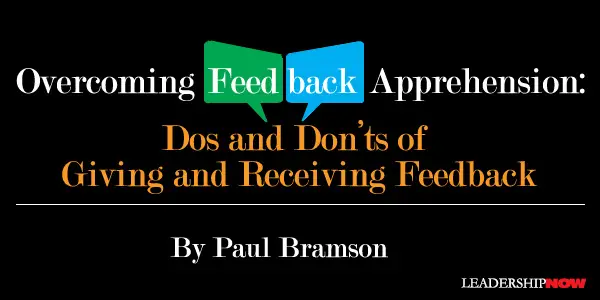
FEEDBACK — often described as a cornerstone of growth — possesses the potential to really inform and shape our professional and personal growth. When we’re open to receiving it and thoughtful in providing it to others, feedback can be very powerful while deepening and enriching relationships overall. So why do so many shy away from asking for or giving feedback? Because being vulnerable and open to what others have to say can be scary. And, if we’re unsure how to provide constructive feedback thoughtfully to others, fear of their reactions will hold us back for sure. Regardless of how you feel, getting input from others and providing it is important, so here are some ways to make it a little easier. The Power of Constructive Feedback A key misconception about constructive feedback is that it’s a critique. It should not be at all; advice like this should bring about thoughtful and productive dialogue. When in a trusted or safe environment, conversations of this nature can serve as a mirror, reflecting our actions, choices, and behaviors, and helping us to see ourselves more clearly. This mirrored reflection, although sometimes uncomfortable, opens avenues for discussion and a supportive environment for improvement. These conversations can guide us toward more effective approaches to things and innovative solutions. Additionally, the impact of constructive feedback extends beyond individual development. In the realm of teamwork and collaboration, this form of feedback becomes a bridge that connects individuals, fostering open communication and shared understanding. When offered in the spirit of improvement and shared success, constructive feedback cultivates an environment where team members feel valued, respected, and motivated to contribute their best. Providing Effective Feedback Giving team members feedback requires sensitivity, finesse, and purpose. When providing someone with information that could be taken as criticism or potentially put them on the defensive, one must proceed with intention, care, and authenticity. When advice and insights are given in a meaningful and thoughtful way, not only does it support the individual, but it builds and fosters trust between people. Here are some things to do or avoid when providing feedback in a way that empowers and fosters learning and growth. Dos Be human: Seems obvious, I know, but too often, one goes in just with an agenda of what behaviors or actions need to be addressed without thinking about how the other person will respond or react. Before you go into these conversations, ask yourself what you want the other person to walk away with and then think about them and what approach for them individually will bring about the most productive, healthy conversation. Embrace a coaching approach: Too often, these conversations are one-sided; start the conversation with an open conversation. Ask the other person what they think is going well and where they see opportunities for growth. Letting someone self-identify is the best way to empower them towards change. Once they have shared, you can have a more productive conversation around their thoughts and layer in anything else from your side, positive or constructive. Be specific and objective: Effective feedback is rooted in clarity. When offering feedback, focus on specific actions, situations, or behaviors rather than vague generalizations. Objectivity is key. Present observations in an unbiased manner — supported by information or examples — to ensure that the feedback remains constructive rather than subjective criticism. Focus on behavior, not personality: Constructive feedback centers around actions and outcomes, not personal attributes. Address behaviors that can be altered, steering clear of judgments about an individual’s character. This approach maintains a supportive tone and encourages change without causing defensiveness. Always conclude with an action plan: When both individuals leave a conversation of this nature, it’s key to ensure that everyone is on the same page with what was talked about, that there is no confusion, and that clear next steps are in place. Additionally, set a time to regroup a few weeks in the future to check in and provide any support. Don’ts Generalize: Feedback loses its impact when it relies on vague statements or generalizations. Avoid phrases like “You always” or “You never,” as they oversimplify complex situations and hinder productive communication. Blame: Effective feedback promotes accountability and solution-finding rather than assigning blame. Avoid pointing fingers or accusing, as this can create defensiveness and undermine the purpose of the feedback. The individual will shut down and walk away with no tangible or actionable paths to improvement. Make assumptions: Feedback should be based on facts, not assumptions or hearsay from a third party if at all possible. Avoid making guesses about someone’s motivations or intentions. Instead, ask questions, learn from their perspective, and focus on observable behaviors or actions. Receiving Feedback with Confidence Receiving feedback can be hard because we are human, and vulnerability is hard. Having areas of opportunity reflected back to us can feel imperfect, which can be uncomfortable for many. Even when one is praised, some might feel awkward or vulnerable. These are normal emotions and feelings. The good news is that with an open mind and some confidence, feedback can be the foundation for personal and professional growth. The principles of receiving feedback with grace and confidence pave the way for transformative change while nurturing our relationship with self-improvement. You’ve heard the cliché that “feedback is a gift,” so embrace it. Dos Cultivate an open mindset: Approach feedback with an open and receptive mindset. Recognize that receiving feedback is an opportunity for growth, regardless of whether it confirms strengths or highlights areas for improvement. Seek clarity: When feedback is given, ask clarifying questions to ensure you fully understand the observations and perspectives shared. If certain points are unclear, ask for examples or further explanation. This demonstrates your openness and commitment to learning and understanding. Show appreciation: Express gratitude for the feedback received, regardless of its nature. By acknowledging the effort someone has taken to provide insights, you create an environment of mutual respect and encourage ongoing constructive dialogue. Don’ts Become defensive: This is a business maturity check. When confronted with feedback, avoid the instinct to become defensive. Defensive reactions can hinder understanding and close the door to growth. Instead, take a moment to absorb the feedback before responding. Disregard or dismiss: Even if the feedback seems unfamiliar or contradictory to your self-perception, resist the urge to disregard it outright. Ask clarifying questions to ensure you understand what is being said. It’s good to remind yourself that every perspective has value, and the insights offered might help uncover blind spots or overlooked opportunities for improvement. Over-personalizing: Receiving feedback is not an evaluation of your worth as a person. Avoid over-personalizing feedback and instead focus on the specific actions and behaviors being discussed. This perspective shift enables you to embrace feedback without it becoming a source of anxiety. The Path to Growth and Success Fostering a culture of growth and continuous improvement lies at the core of effective feedback dynamics. Encouraging an environment where feedback is not only accepted but actively sought, creates a fertile ground for learning and enhancement. In this arena, feedback isn’t seen as criticism but rather as a valuable tool that empowers individuals to excel. In the sphere of personal and professional development, the navigation of feedback — both providing and hearing — is an indispensable element guiding individuals toward growth and success. When provided with good intention, authenticity, and caring, as well as absorbed with receptivity, feedback becomes a powerful catalyst for improvement, refining skills, and strengthening relationships and sets the stage for a growth-minded workplace for all. 
Posted by Michael McKinney at 02:02 PM
09.14.23

Leading Thoughts for September 14, 2023
IDEAS shared have the power to expand perspectives, change thinking, and move lives. Here are two ideas for the curious mind to engage with: Brad Stulberg on diversifying your identity: “One of the most important parts of developing an identity that can thrive, persist, and endure change is to diversify your sense of self. You can think of identity like a house. You want the house to have multiple rooms. Perhaps there is a ‘parent’ room; an ‘athlete’ room; an ‘employee,’ ‘entrepreneur,’ or ‘executive’ room; a ‘community member’ room, and so on. It’s okay to spend a lot of time in just one room, but you’ve got to ensure you keep the others in good enough shape. This way, when you experience a massive change or disorder event in one area of your life, in one room of your identity, you can step into other areas to gain your footing and stability. Like a diversified portfolio in investing, diversifying your sense of self makes you more rugged and flexible in the face of change.” Source: Master of Change: How to Excel When Everything Is Changing – Including You Peter Block on freedom and accountability: “The search for freedom—freedom being the choice to be a creator of our own experience and accept the unbearable responsibility that goes with that. Out of this insight grows the idea that perhaps the real task of leadership is to confront people with their freedom. This may be the ultimate act of love that is called for from those who hold power over others. Source: Community: The Structure of Belonging Look for these ideas every Thursday on the Leading Blog. Find more ideas on the LeadingThoughts index.
Posted by Michael McKinney at 10:22 AM
09.12.23

Out of Context: Preparing for the UnexpectedPRACTICING one drill over and over is like playing computerized brain-training games. Performance on that one drill or computer games will improve over time but it won’t transfer to the real world, where an infinite combination of patterns exists. By overloading the cognitive circuits during training, a player’s neural network is better prepared to compute new solutions to one-of-a-kind, in-game situations. You have to present new activities that players are not used to doing. If you repeat exercises too much the brain thinks it knows the answers. By constantly challenging the brain and making use of its plasticity you discover a world that you thought was never available. Once the brain picks up the challenge you create new connections that gives remarkable results. —Leonard Zaichkowsky,
The Playmaker's Advantage: How to Raise Your Mental Game to the Next Level
Posted by Michael McKinney at 07:12 PM
09.11.23

10 Key Lessons for Entrepreneurs from the House that Cheese Built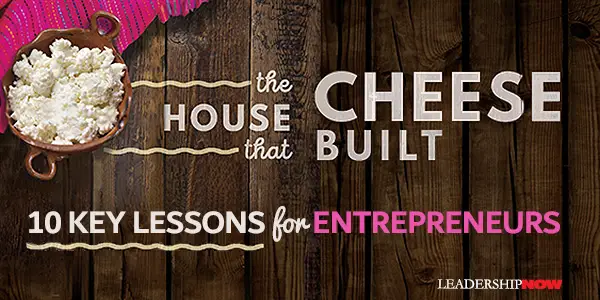
IT ALL STARTED with cheese. Miguel Leal didn’t start out wanting to make cheese. He was just looking for a “job that would help me survive the disaster of my father’s death and the mess I’d made of my own education and life so far.” Cheese found him. Learning all he could from the cheese manufacturers he worked for in both Mexico and the United States, he eventually started Mexican Cheese Producers with his partner David Webster. They built into a multi-million dollar company before selling it to Sigma Alimentos. Lean shares the ups and downs of his journey in The House that Cheese Built. It is a heartfelt, interesting story. From his experience, he pulled together ten key lessons for entrepreneurs: 1. Hard Times Can Be Your Best Teachers. “Because I had no means of support other than my own wits, I became adept at watching other people and learning through observation and experience. Desperate to better myself, I applied a laser-like focus to every task in front of me, learning what I needed to know.” 2. Be Your Own Best Customer and Make Something People Want. “Think about what you want that isn’t already out there. Focusing on the marketplace and testing what your customers want is a much surer strategy for growth than trying to outsmart your competitors.” 3. Take Satisfaction in Achieving Small Steps Toward Your Goal. “Thinking too far in advance can cause you to stumble and give up because it makes your goals seem impossible to reach. Instead, set small, incremental goals that are realistic to achieve. You’ll make steady progress that way.” 4. Get Your Emotions Under Control Before Making Important Decisions. “In the business arena, just like in every other part of your life, certain events will spark strong emotions … and you find yourself obsessing over what happened. Your vision tunnels, and you can scarcely breathe because tension is like a lasso around your ribs. But no good business decision can be made in that kind of emotional state. Pause and take a breath. When you’re calm, consider your options, actions, and potential consequences. The act.” 5. Everything in Life Happens for a Reason—Even Obstacles. It’s easy to say, “I can’t do it,” when we hit a roadblock. “Instead of letting myself quit, I persisted, tackling one roadblock at a time and viewing each obstacle as a new learning opportunity. Practice saying yes to new opportunities whenever you confront a roadblock. Sometimes, if it’s hard to jump over an obstacle, people make the mistake of not moving because they’re afraid of falling down. But if you want to succeed in business, you must keep finding new ways to push through obstacles, hurdle over them, or go around them one step at a time until you reach your desired destination.” 6. Let Failure Inspire You. “Take joy in learning from your mistakes and let failure inspire you. Otherwise, life will surely keep hitting you in the same spot. Each problem you resolve is a learning experience.” 7. The Rhythms of Life Will Change as You Succeed, but Stay Alert. “Imagine your business as a tiny snowball and you’re pushing it up a mountain. The higher you get on the mountain, the more snow you gather (and maybe some rocks, too). As the snowball gets bigger and bigger, it will take more effort to keep pushing it up the mountain. Finally, you reach the summit, and suddenly your journey is a downhill one. However, even though your effort will change—you will no longer be pushing that snowball to maintain momentum—you can’t take your eye off the snowball.” 8. Happiness and Success Are Never Permanent and Are Not Tied to Wealth or Ambition. “Happiness and success are intangible things. Only you can define what they mean to you, and those definitions will likely shift over time. A fulfilling career is never about the money, in the end, but about realizing your true passions. The same is true of relationships.” 9. To Succeed in Business, You Need to Persuade Others to Take a Risk on You. “Develop a strong, consistent personal brand that evokes confidence in everyone around you, especially financial partners. This means demonstrating consistent reliability in your ethics and consistency in how you show up.” 10. Develop an Exit Strategy. “Your exit strategy should be based on examining your own physical and mental health, whether you’re in a position to build a legacy company for future generations, and evaluating whether you have money enough to live according to your own needs and values—not some arbitrary dollar amount.” 
Posted by Michael McKinney at 11:39 AM
09.08.23

Positive Chaos: How to Transform Crisis into Clarity and Advantage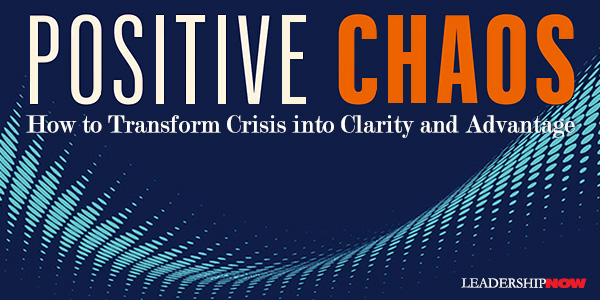
CHAOS is ubiquitous and inevitable. But with the right mindset and skillset, you can turn it to your advantage. In Positive Chaos, Dan Thurmon explains how to do just that. He says, “The trick is to intentionally and consistently choose a perspective that serves you.” There are many ways to see the world. Quite naturally, we tend to see chaos as overwhelming, confusing, stressful, and frenzied. But as random as chaos may seem to be you will often find that there is order in the chaos. Chaos and order aren’t polar opposites. They coexist. They are interrelated and connected, two sides of the same coin. There may be order in what you currently perceive as chaotic, and amid the unknowable and seemingly random circumstances, there are predictable opportunities. Everything is connected. Everything affects everything else. When chaos happens, we are more inclined to flee than to grow. Chaos happens, but we need to become a creator of positive chaos. That is to say, we need to seize the chaos as an opportunity to transform ourselves, accomplish, and positively influence others to do the same. Why don’t we? Why do some people grow and learn, and others flounder? Thurmon says we limit ourselves around three issues and questions: Willingness—Will I do what it takes? Why does this matter?
We must take control of our inputs. “Small, almost imperceptible changes to the inputs produce huge variation over time. What are your inputs?” Thurmon often asks, “What is the one action you could take or change that would effectively change everything?” If you limit yourself to what’s comfortable, you deny yourself what’s possible. No matter where you look, you have a buffet of built-in excuses and justifications for mediocrity. For change to occur, things must be out of balance. Balance is static. So, you must go off-balance intentionally to grow. “To make things happen intentionally, you must maintain stability while creating disequilibrium.” A system, an object, or a person can preserve stability while they undergo change. And the more stable, functionally sound, and grounded they are, the easier the person, system, or object can incorporate changes without being completely disrupted. A change in perspective will help you to upgrade your response system. What’s happening to you is not new. Life presents us with reoccurring patterns. “Today’s chaos is a new version of what you’ve already been through. The key to working with chaos is your perspective. I challenge you to place more emphasis on the long-term recurring challenge versus the next right move.” When uncertainty and randomness strike, whether the immediate perception is threatening or exciting, you don’t take it personally. You simply see it as a new factor to incorporate into your life. This is not about the challenge coming at you. It’s about the challenge coming from you. It’s not what’s testing you, but how you are choosing to test yourself. When chaos and uncertainty loom large in our lives, we tend to turn negative and overthink. We need to pause and ask, “Are these thoughts helping me now?” To face what is happening with confidence, we need to “find the familiarity by seeing similarities to other situations we’ve already been through—other skills and lessons we’ve already utilized. Leverage your past to be more present and create a better future.” Draw upon what is already within us. Build momentum. “Momentum is your ability to move yourself and your initiatives forward. If you aren’t moving, thinking, creating, growing, connecting, or exploring, then you are beginning to weaken, withdraw, and stagnate.” In times of chaos and uncertainty, leaders provide clarity. “In an environment where everything is loud, important, and overwhelming, they point to the one thing that matters most. They emphasize values and reinforce intentions. Further, they spread the mission through their daily actions, constantly reminding others: This is what we do. And this is why we do it.” I’ve just hit some highlights here that will hopefully stimulate your thinking and add to your perspective. There is so much to gain from this outstanding book. You’ll even learn a simplified version of Chaos Theory and how it relates to your life and growth. 
Posted by Michael McKinney at 10:59 AM
09.07.23

Leading Thoughts for September 7, 2023
IDEAS shared have the power to expand perspectives, change thinking, and move lives. Here are two ideas for the curious mind to engage with: Carey Nieuwhof on character: “If you don’t nurture your character daily, you can be most admired by the people you know least, while the people who know you best struggle with you the most. Jeffrey Pfeffer on not deceiving yourself into getting complacent: “Once people believe they are better leaders—possibly because they have given talks or written about positive leadership, have attended lots of leadership trainings, or because they were once acknowledged for their good leadership—they are less likely to be as vigilant about their subsequent behavior, having already demonstrated their leadership credentials. Source: Leadership BS: Fixing Workplaces and Careers One Truth at a Time Look for these ideas every Thursday on the Leading Blog. Find more ideas on the LeadingThoughts index.
Posted by Michael McKinney at 06:26 AM
09.01.23

First Look: Leadership Books for September 2023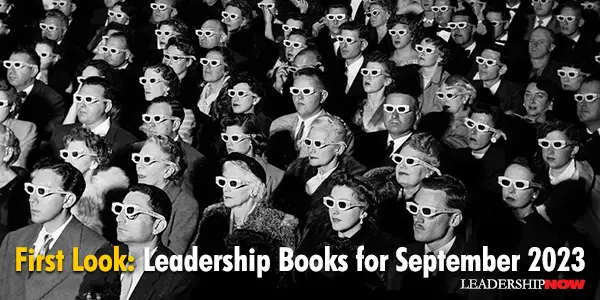
HERE'S A LOOK at some of the best leadership books to be released in September 2023 curated just for you. Be sure to check out the other great titles being offered this month.
We used to think of failure as the opposite of success. Now, we’re often torn between two “failure cultures”: one that says to avoid failure at all costs, the other that says fail fast, fail often. The trouble is that both approaches lack the crucial distinctions to help us separate good failure from bad. As a result, we miss the opportunity to fail well. After decades of award-winning research, Amy Edmondson is here to upend our understanding of failure and make it work for us. In Right Kind of Wrong, Edmondson provides the framework to think, discuss, and practice failure wisely. Outlining the three archetypes of failure—basic, complex, and intelligent—Amy showcases how to minimize unproductive failure while maximizing what we gain from flubs of all stripes. She illustrates how we and our organizations can embrace our human fallibility, learn exactly when failure is our friend, and prevent most of it when it is not. This is the key to pursuing smart risks and preventing avoidable harm.
From social disruptions like economic recessions, pandemics, and new technologies to individual disruptions like getting married, career transitions, and becoming a parent, we undergo change and transformation—both good and bad—regularly. Change is not the exception, it’s the rule. Yet we endlessly fight it, often viewing it as a threat to our stability and sense of self. Master of Change flips this script on its head and offers a path for embracing and even growing from life’s constant instability. Brad Stulberg, sustainable excellence expert, coach, and bestselling author of The Practice of Groundedness, offers a new model that describes change as an ongoing cycle of order, disorder, and reorder—yes, we return to stability, but that stability is somewhere new. Drawing on modern science, ancient wisdom, and daily practice, Stulberg offers concrete principles for developing a mindset called rugged flexibility, along with habits and practices to implement it.
Discover how leaders from the world’s most successful companies are dealing with stress, pressure, and constant change—and still thriving. Backed by psychological research and brain science, Fast Forward’s 5 Power Principles have helped more than 100,000 professionals achieve extraordinary success and happiness. As they have excelled, so have their businesses and teams. For the first time, authors Wendy Leshgold and Lisa McCarthy share their proven system along with compelling stories from the people who have made their boldest ambitions a reality. Fast Forward will help you and your teams create the life you want this year and every year.
From the author of Steve Jobs and other bestselling biographies, this is the astonishingly intimate story of the most fascinating and controversial innovator of our era—a rule-breaking visionary who helped to lead the world into the era of electric vehicles, private space exploration, and artificial intelligence. Oh, and took over Twitter. For two years, Isaacson shadowed Musk, attended his meetings, walked his factories with him, and spent hours interviewing him, his family, friends, coworkers, and adversaries. The result is the revealing inside story, filled with amazing tales of triumphs and turmoil, that addresses the question: are the demons that drive Musk also what it takes to drive innovation and progress?
The most effective leaders are “human leaders:” leading with empathy, vulnerability, and authenticity. But many still adhere to the outdated myth that leaders must be “superhero leaders: infallible, unflappable, and fearless." Tragically, their innate ability to inspire remains locked within, blunting their impact. In The Unlocked Leader veteran executive leadership coach Hortense le Gentil combines real life stories, rigorous research, and practical tools to explain how superhero leaders can become effective human leaders. You’ll discover: How to identify the mental obstacles that stand between you and leadership authenticity, and sap your energy and impact - your mindtraps. How to confront your fears and escape those traps by operating a mindshift. Practical strategies to better connect with yourself and others - a mindbuild.
Leaders have an unprecedented opportunity to overcome the great disconnect between employers and employees by inviting individuals to become part of something bigger than themselves—to belong. The need to belong is innate and enduring, yet often elusive. Genuine belonging requires a bold approach, one that offers both depth and credibility to the work required from leaders whose organizations are craving a sense of connection, security, and acceptance. Belonging Rules offers nuanced, direct guidance for navigating both the pre-existing and ever-evolving social and organizational demands of today’s workplace. The five rules within, based on extensive research and application, create a framework to dissect and decode the complex, complicated, and controversial issues of the modern workforce.
 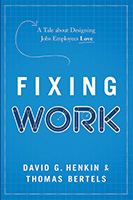 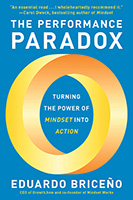 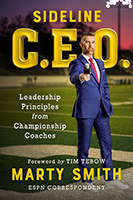
“... a mind needs books as a sword needs a whetstone, if it is to keep its edge.” — George R.R. Martin, A Game of Thrones
Posted by Michael McKinney at 07:10 AM
|
BUILD YOUR KNOWLEDGE


How to Do Your Start-Up Right STRAIGHT TALK FOR START-UPS 
Grow Your Leadership Skills NEW AND UPCOMING LEADERSHIP BOOKS 
Leadership Minute BITE-SIZE CONCEPTS YOU CAN CHEW ON 
Classic Leadership Books BOOKS TO READ BEFORE YOU LEAD |
|